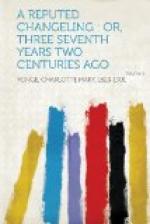“So, Charley, old fellow, you were the sad dog after all. You got me out of it, and I owe you my thanks, but you need not have put your neck into the noose. I should have come off with flying colours, and made them all make fools of themselves, if you had only waited.”
“Do you think I could sit still and see her put to the torture?” said Charles.
“Torture? You are thinking of your barbarous countries. No fear of the boot here, nor even in Scotland nowadays.”
“That’s all the torture you understand,” muttered Sir Edmund Nutley.
“Not but what I am much beholden to you all the same,” went on Sedley. “And look here, sir,” turning to his uncle, “if you wish to get him let off cheap you had better send up another special retainer to Harcourt, without loss of time, as he may be off.”
Sir Edmund Nutley concurred in the advice, and they hurried off together in search of the family attorney, through whom the great man had to be approached.
The four left together could breathe more freely. Indeed Dr. Woodford would have taken his niece away, but that Charles already had her in his arms in a most fervent embrace, as he said, “My brave, my true maid!”
She could not speak, but she lifted up her eyes, with infinite relief in all her sorrow, as for a moment she rested against him; but they had to move apart, for a servant came up with some wine, and Charles, putting her into a chair, began to wait on her and on his father.
“I have not quite forgotten my manners,” he said lightly, as if to relieve the tension of feeling, “though in Germany the ladies serve the gentlemen.”
It was very hard not to burst into tears at these words, but Anne knew that would be the way to distress her companions and to have to leave the room and lose these precious moments. Sir Philip, after swallowing the wine, succeeded in saying, “Have you been at home?”
Charles explained that he had landed at Gravesend, and had ridden thence, sleeping at Basingstoke, and taking the road through Winchester in case his parents should be wintering there, and on arriving a couple of hours previously and inquiring for them, he had heard the tidings that Sir Philip Archfield was indeed there, for his nephew was being tried for his life for the wilful murder of Major Oakshott’s son seven years ago.
“And you had none of my warnings? I wrote to all the ports,” said his father, “to warn you to wait till all this was over.”
No; he had crossed from Sluys, and had met no letter. “I suppose,” he said, “that I must not ride home to-morrow. It might make my sureties uneasy; but I would fain see them all.”
“It would kill your mother to be here,” said Sir Philip. “She knows nothing of what Anne told me on Sedley’s arrest. She is grown very feeble;” and he groaned. “But we might send for your sister, if she can leave her, and the boy.”




